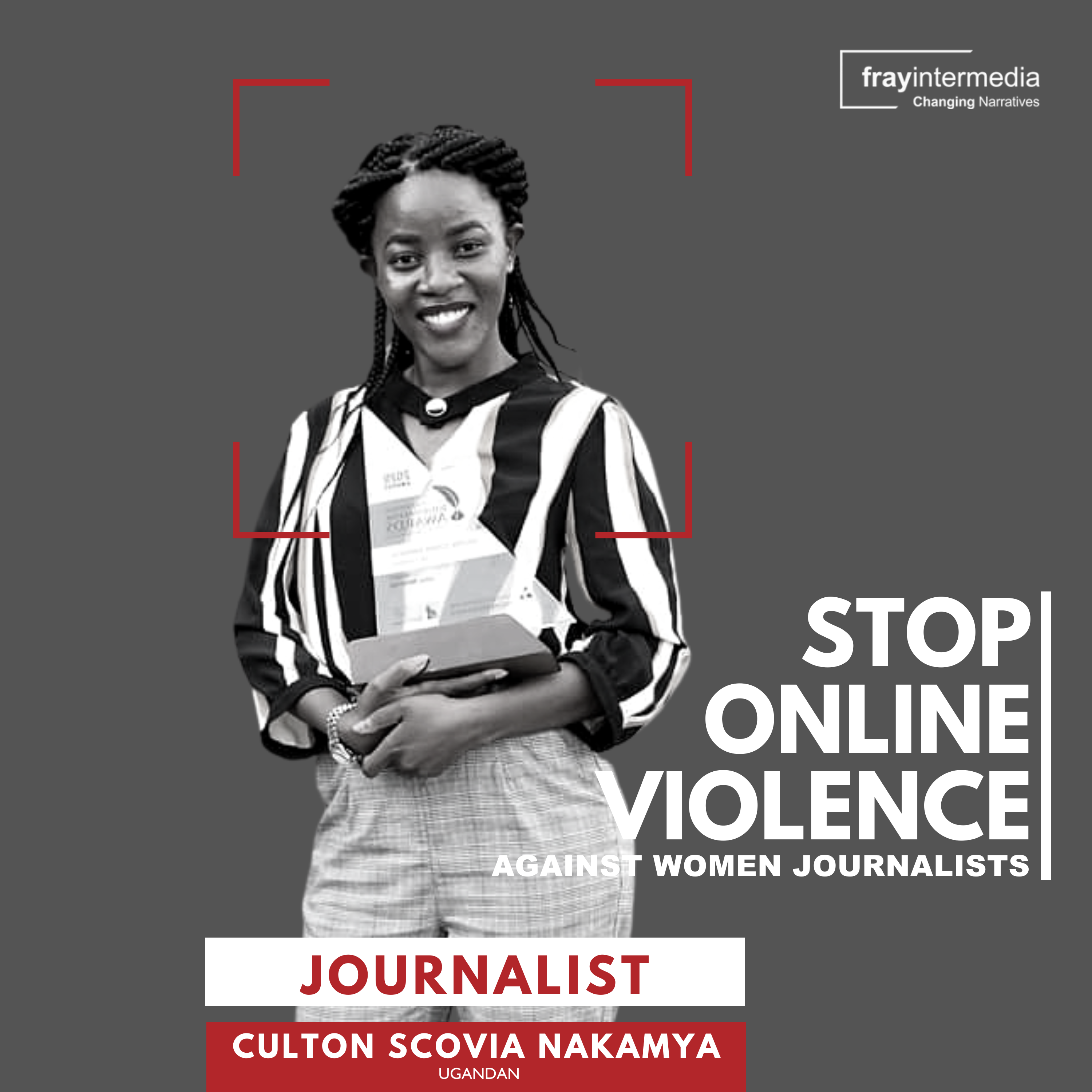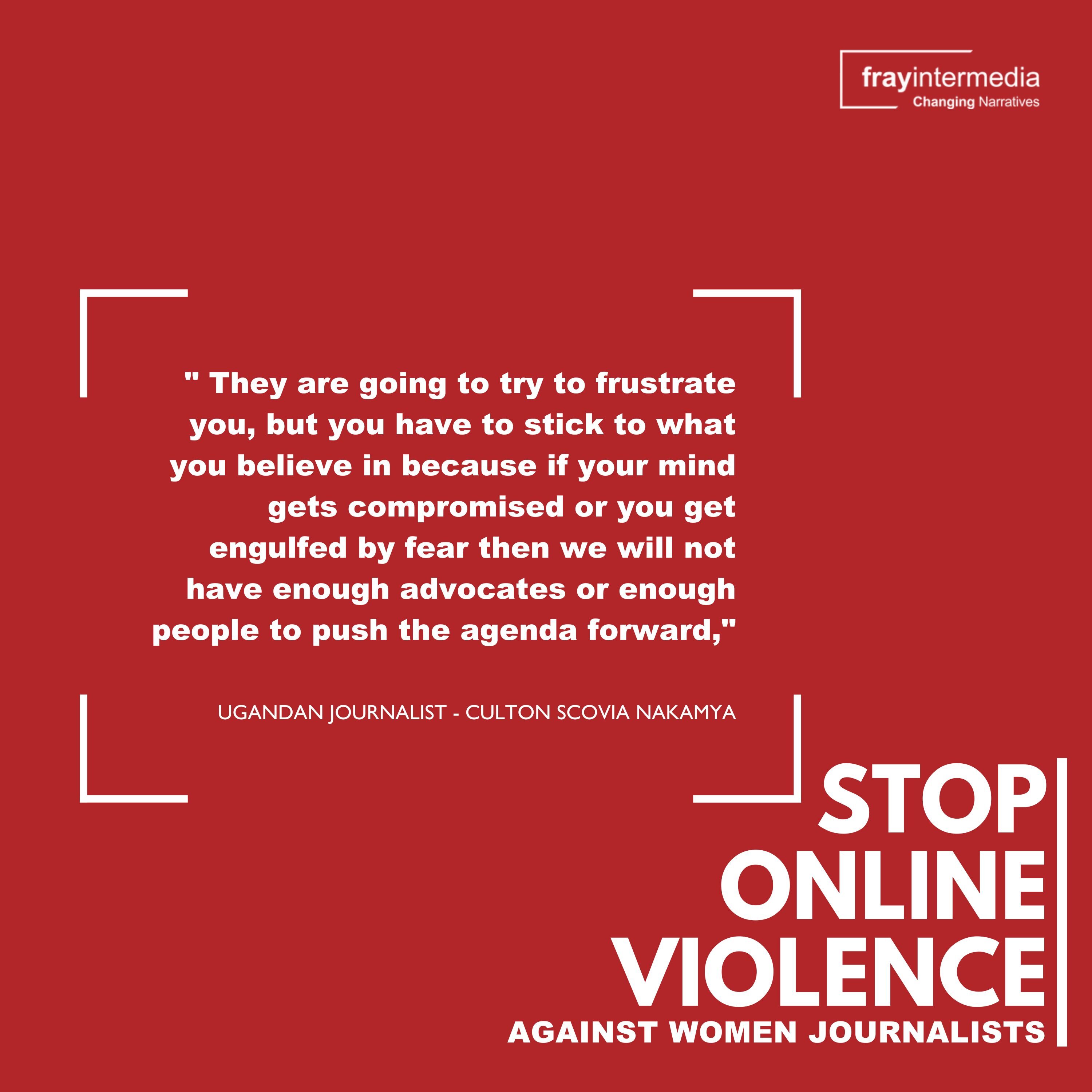In a vicious game to scorn and discredit African women journalists, award-winning Ugandan journalist and women’s rights advocate Culton Scovia Nakamya says gender and even tribe become fair game for online trolls in their work to push women journalists to self-censor.

Globally, women journalists and media workers face increasing offline and online attacks and are subject to disproportional and targeted threats. These attacks, often gendered, include stigmatisation, sexist hate speech, trolling, physical assault, rape and even murder.
In 2020, an extensive research study by UNESCO and International Center For Journalists (ICFJ) found that nearly three-quarters of the female journalists surveyed had experienced online violence in the course of their work. They are often targeted in coordinated misogynistic attacks, harming women’s right to speak and society’s right to information.
In an interview with frayintermedia, Nakamya speaks about her experience with online violence and raising her voice against the noise.
Q: Online violence is the new frontline in journalism safety – and women journalists sit at the epicentre of risk. What is your experience with online violence?
A: I’m a victim. It got bad at the peak of the 2021 presidential elections in Uganda. I was following a campaign trail of an opposition leader who was the main opponent of the now-president Yoweri Kaguta Museveni. When that campaign ran, people were not allowed to gather to join rallies. So everybody entirely depended on television stations and social media platforms. They closely followed the journalists that followed the different presidential campaigns of their choice.
So when you tweet an update or when you post on social media about a candidate you’re following, you are prone to abuse; this was very common with the incumbent.
Facebook and Twitter disconnected hundreds of accounts in Uganda during that election period because there were fake accounts deployed to abuse, harass and demean everybody that portrayed anything against their will.
So if you post an update an account will abuse you and while you block some of them, you can’t manage to block all of them. Another account abuses you and they go personal. You post an update, somebody says, “Hey, sorry, this government is going nowhere, sorry, you’re as shortsighted as you are,”. It’s often petty.
I try to not take them personally. The way they operate is in such a way that they want to reduce you to a certain level such that you give up on what you stand for. If you stand for quality journalism, they want you to give up on that.
If we talk about online violence, it cannot be unpacked as a stand-alone issue. It also comes with gender-related violence. When I post on social media about a horrible road or how much money was swindled or an ineffective government employee and your response is personal because of my gender or my tribe then you’re simply reducing me to be little and that’s not where I belong.
Q: Do you now take any special precautions when expressing yourself on social media or in your stories?
A: I honestly do take precautions, but I stand for the truth. Before I put up any social media posts, sometimes I type a post and delete it three times before posting. I always ask myself which better context can I put in to avoid being misquoted. I don’t want to be judged or attacked. Even when expressing my opinion, I still look for a professional way to express myself so that when attacked, I can easily defend myself.
Many times I censor myself but when I have the facts I have to table them because it doesn’t change anything; it remains the fact.
Q: Online attacks have real-life impacts. What does online violence impact on your mental health and productivity?
A: It is so stressful because first of all, you think when somebody says something and you read it. When you read it, your mind has to process it. In the context of processing what the other party has written, you’re thinking about what the best response is. This is where there can sometimes be unnecessary exchanges and other times you ignore them and do not respond to them but still, it doesn’t change the fact that you’re mentally disturbed by it.
It can disturb you for a few minutes but I personally learned to give myself the freedom I deserve from such things. There could be a comment on social media but as long as I know it’s not what I stand for and it’s not the truth then I don’t invest in thinking about it further as much as I give it a thought.
Even when attempting to make sense of why some things were said, you cannot reason the same because some people are paid to abuse. They only wake up to who has tweeted what using their fake account, and who has said what so that they can attack and abuse, and at the end of the day when you respond to them, they get a happy paycheck.
So on second thought I sit back and think to myself that you cannot throw a stone at every barking dog. Sometimes you have to let the stray dogs be and as long as what you have tabled is a fact, you have to move on. It’s what I’ve trained my mind to do. But it doesn’t take away the fact that many times and, I say many times, in the process of contextualising and understanding what they’ve said to you online, it affects you.
Sometimes you’re doing something and you’re distracted because you are reading a response on Twitter or on Facebook. It affects you psychologically, but you have to train your mind to be steadfast and to move on and understand what is the motive, why they say some things and who is behind them. When you understand that, then you know, you’re good to go.
Q: Orchestrated disinformation campaigns weaponise misogyny to chill critical reporting and discredit women journalists. How have you managed to keep raising your voice against all the noise?
A: It is the love for a better country and a better society. We live in an environment where people still think women are not supposed to speak. We live with people saying, when you raise your voice and you’re a woman, you are misplaced. When you advocate for something better, they think you’re integrating the Western culture into their culture.
When you criticise what is wrong, they think you’d be de-campaigning the country. It’s quite a lot to know that the society we live in has not changed to where we think it should be, because for me, sometimes I do gender-based work, and then when you do it, somebody can come and tell you, “Hey, so you want women to be above men? So it means even in the future, you want women to marry men?”
It’s about equality. Equality doesn’t mean women taking over men’s roles in society. All it means is that if you have access to better education, as a woman I deserve the same. If you have access to better pay in the workplace, so should a woman. We should have equal pay for an equal value of work. I want social justice. So, it’s my belief and I work every day because I want a better society.
Q: In the context of an increasingly toxic information ecosystem for women, what does gendered online violence against women communicators mean for women’s narratives and rights?
A: If we don’t continue doing what we do, then we cannot empower other women to do what we’re doing. If I get up on some firm for what I believe in, I think possibly another female journalist will be motivated and will be inspired to do the same for another woman because we have to lift each other; it simply means we have to push even in a toxic environment.
Sometimes I walk down the street and people can recognize me because of my TV work. And with others, when you mention your name, they say they know me from Twitter, I’m a fighter. I mean, you cannot brand me a fighter. I’m not in a boxing ring. We are just trying to raise issues that probably many of our colleagues cannot raise.
So we just have to continue doing what we do to one another and demand what belongs to us.

Q: What advice would you give to a woman journalist who is being targeted online?
A: First of all, online work requires you to have digital safety tools at your fingertips. I don’t know how many times attackers have tried to hack my accounts, my Twitter account, Gmail, and even my Facebook account.
You need to have a lot of digital safety and online safety tools with you because just one tweet is enough to frustrate you. Just one post is enough for a hacker account and you don’t know what they are going to do with that account once it’s in their control. They can send pornography or use it to damage your reputation.
So the key principle is, first of all, to secure your digital platforms before doing anything else. Have your facts right and stand for what is true. And this profession does come with a cost. There are going to be several intimidations. There are going to be several attackers deployed to monitor your account – what you’ve posted, what you do, what you’ve done, and which story you’re working on.
They are going to try to frustrate you, but you have to stick to what you believe in because if your mind gets compromised or you get engulfed by fear then we will not have enough advocates or enough people to push the agenda forward.
So it really calls for a lot of determination to do better.

